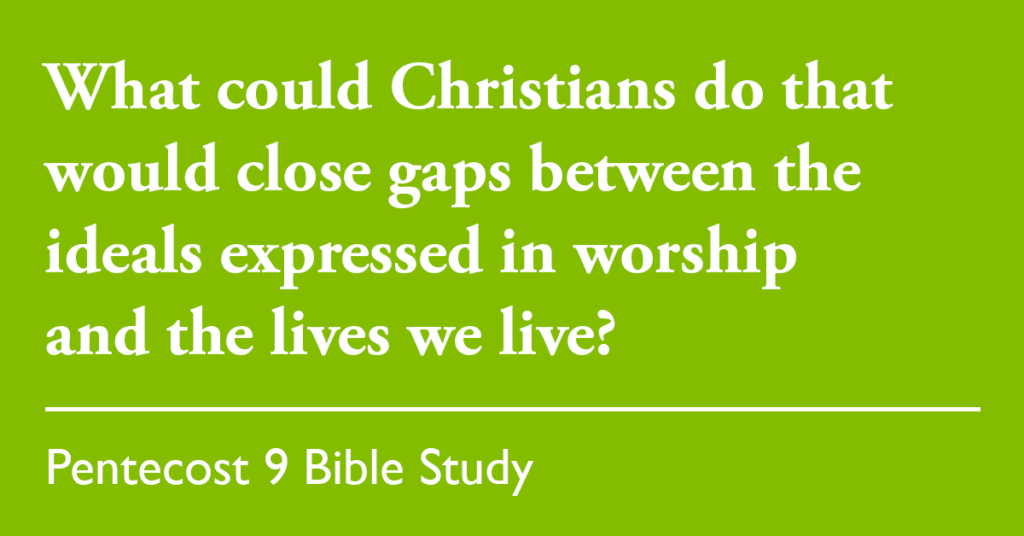This page is available in: Español
Bible Study: Proper 14 (C) – 2022
August 07, 2022
[RCL] Isaiah 1:1, 10-20; Psalm 50:1-8, 23-24; Hebrews 11:1-3, 8-16; Luke 12:32-40

Isaiah 1:1, 10-20
The part of Isaiah that this reading comes from was written before the Babylonian Exile and is part of a series of oracles against Judah and Jerusalem. Judah was the southern part of what was once the united kingdom of Israel.
God’s words to the people of Judah are hard to hear. The oracle Isaiah preaches compares Judah and the temple worship in Jerusalem to Sodom and Gomorrah, and God refuses to hear their prayers. Though God does not abide the sins of Israel – their offerings are worthless in the shadow of their injustices – there is an opening for them to restore their relationship, to come back into covenant.
First, God opens the way for the Israelites to learn to do what pleases God: “Learn to do good; seek justice, rescue the oppressed, defend the orphan, plead for the widow” (1:17). Then, God invites the people into a conversation: “Let us argue it out” (1:18) refers to reasoned argumentation, not aggressive confrontation. God wants to reach toward the people with open hands of forgiveness and will accompany them as they work toward it.
- In this passage, Isaiah points out a disconnect between the worship of the people in the temple and what they do outside of the temple. Do you observe the same disconnect in Christians? What are some examples of this?
- What could Christians do that would close gaps between the ideals expressed in worship and the lives we live?
Psalm 50:1-8, 23-24
This psalm continues the theme of God’s judgment, evident in the reading from Isaiah. God calls all of creation as witnesses to what seems like a heavenly court proceeding, at which the rightness of God’s people is assessed. There is reference to sacrifice and offerings – alluding to the worship practices of the people of Israel – concluding with the promise of salvation for those who offer “the sacrifice of thanksgiving” (50:24).
For Christians, the Eucharist is closely associated with Thanksgiving. Referred to as “The Great Thanksgiving,” it is considered by the Book of Common Prayer to be our “principal act of Christian worship on the Lord’s Day and other major Feasts” (BCP, p. 13). The language of our Eucharistic prayers uses the words “sacrifice,” “offering,” and “thanksgiving” quite liberally. We are encouraged to bring our hearts and bodies to God during the Eucharist. Many congregations celebrate the Eucharist weekly, though, during the lockdowns imposed as a result of COVID-19, most congregations refrained.
- This Psalm shows judgment being made on worship and sacrifice. If we were to imagine God coming in judgment, how might God assess our “sacrifice of thanksgiving”?
- How might we offer our worship in a more thanksgiving-forward way?
Hebrews 11:1-3, 8-16
In this passage from Hebrews, we hear the story of Abraham and Sarah cast as a story of faith in God’s promises. Abraham and Sarah, argues the writer, trusted that God’s promises would be fulfilled in God’s own time. These words were likely written within 50 years of Jesus’ resurrection and were meant as an assurance to those following the nascent Christian faith that, if Abraham and Sarah can act in faith, trusting that God would prepare a city for them, Christians can draw inspiration from them, and trust that God’s will shall unfold in God’s own time.
It’s been a long time since these words were written to reassure first-century Christians. We are still waiting for the full revelation of God’s kingdom on earth. Just like the descendants of Abraham, many generations of Christians “died in faith without having received the promises, but from a distance they saw and greeted them” (v. 13).
- Sometimes, the idea that the promises of God will be revealed in God’s own time can breed complacency. But the author of Hebrews argues that Abraham’s, Sarah’s, and their offspring’s faith in God’s future promises kept them moving. Is there a promise you hope for that inspires your faith? How does that promise inspire you?
Luke 12:32-40
This Gospel reading brings together the themes of trusting the future to God and God’s judgment, evident in today’s other readings. The verse “For where your treasure is, there your heart will be also” (12:34) is one of the most well-known verses in the Bible – maybe you’ve heard it used in a stewardship campaign. But this comes after verses about selling possessions, giving alms, and making purses that do not wear out, to store the treasure in heaven. It may be about trading your certainty for uncertainty, trust in what kingdoms of earth can give for what the kingdom of God can bring.
Verses 35-39 have a sense of urgency: be ready for the master to return! Jesus says to “have your lamps lit” (35), to “be ready” (40). Today we might say “keep your ringtone on!” Why? Because we don’t know when the Son of Man will arrive (v. 40). What are we to be ready for? “The kingdom” that is the “Father’s good pleasure to give to you” (32).
- This Gospel reading tells us to be ready for the kingdom of God’s arrival at an unexpected hour. What images does “the kingdom of God” bring to mind for you?
- How would you describe life in the kingdom of God? How does the phrase “good pleasure” fit with those images, that description?
This page is available in: Español
Don’t forget to subscribe to the Sermons That Work podcast to hear this sermon and more on your favorite podcasting app! Recordings are released the Thursday before each liturgical date.
Receive Free Weekly Sermons That Work Resources!
This page is available in: Español


